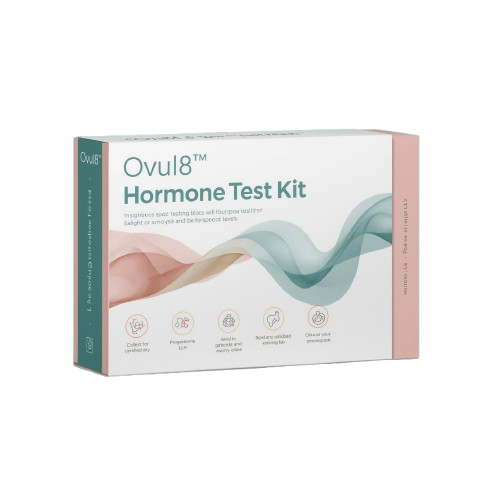Description
Hormonal Test: Understanding Your Body’s Balance with EIRMED
Description
Looking for information about hormonal test and its importance? At EIRMED, we explain how hormonal tests work, why they matter for fertility and overall health, and what to expect. Learn about different types of hormone tests, their role in male and female fertility, and how they guide treatment. A simple guide designed to answer your questions and help you make informed health decisions. Discover everything you need to know about hormonal testing in a clear, easy-to-read way.
Introduction
A hormonal test is a medical test that measures the levels of hormones in your blood, saliva, or urine. Hormones are chemical messengers that control nearly every process in the body, from growth and energy to fertility and mood. When hormones are not balanced, you may experience symptoms like irregular periods, weight changes, hair loss, mood swings, or difficulty conceiving.
For anyone struggling with fertility, fatigue, or unexplained health issues, hormonal testing is often the first step doctors recommend. At EIRMED, we provide guidance, treatments, and products related to hormonal health, making it easier for you to understand your body and take control of your well-being.
Why Are Hormonal Tests Important?
Hormones affect almost every organ system. If one hormone is out of balance, it can disrupt many areas of life. Hormonal tests can help in:
- Identifying fertility issues (male and female)
- Diagnosing thyroid problems
- Checking reproductive health (PCOS, menopause, low testosterone)
- Evaluating stress and adrenal function
- Monitoring treatment progress
By knowing your hormone levels, your doctor can recommend lifestyle changes, supplements, or medicines to restore balance.
Types of Hormonal Tests
H2: Reproductive
- Female Fertility Tests: These measure estrogen, progesterone, LH, and FSH. They help identify ovulation problems, PCOS, or early menopause.
- Male Fertility Tests: Focus on testosterone and sperm-related hormones. Low testosterone may lead to low sperm count or poor quality.
H2: Thyroid Hormonal Tests
The thyroid gland regulates energy and metabolism. Tests usually include TSH, T3, and T4. Imbalance can cause fatigue, weight changes, and infertility.
H2: Stress and Adrenal
Cortisol is the main stress hormone. High or low levels may indicate adrenal fatigue or stress-related disorders. Testing can help manage anxiety, weight issues, and sleep problems.
H2: Other Common
- Insulin: Regulates blood sugar and affects weight.
- Prolactin: Important for breastfeeding but high levels can stop ovulation.
- DHEA: Affects fertility, mood, and energy.
When Should You Consider a Hormonal Test?
You should think about a hormonal test if you notice:
- Irregular or missed periods
- Difficulty getting pregnant
- Sudden weight changes
- Unexplained hair loss or acne
- Fatigue or mood swings
- Low sex drive
Getting tested early allows for faster diagnosis and better treatment outcomes.
How is a Hormonal Test Done?
Most hormonal tests involve a simple blood test, usually taken in the morning. Some tests may require saliva or urine samples for more accurate results. Your doctor may also ask you to take tests on specific days of your menstrual cycle (for women) to measure reproductive hormones accurately.
Preparing for a Hormonal Test
Here are a few tips before taking your test:
- Avoid heavy exercise 24 hours before testing.
- Fast if your doctor instructs (some tests require it).
- Take note of medications or supplements you use.
- For women, track your menstrual cycle dates.
How Hormonal Tests Help in Fertility Treatment
At EIRMED, we often see patients who have been trying to conceive without success. A hormonal test gives valuable insights into the root cause. For example:
- If a woman’s progesterone is low, it may mean ovulation isn’t happening regularly.
- If a man’s testosterone is low, fertility supplements or lifestyle changes may help.
With accurate results, doctors can design a personalized treatment plan, including medicines, powders, or capsules available at EIRMED.
Benefits of Getting a Hormonal Test
- Early detection of health issues
- Personalized treatment options
- Better fertility outcomes
- Improved energy and mood
- Clear understanding of body changes
FAQs About Hormonal Tests
Q1. How long does it take to get hormonal test results?
Most results are available within 1–3 days, depending on the lab and type of test.
Q2. Do hormonal tests hurt?
No, it’s just a small blood draw, similar to other routine tests.
Q3. Can I test hormones at home?
Yes, some home kits are available, but lab-based tests are more reliable.
Q4. Are hormonal tests covered by insurance in the US?
In many cases, yes—especially if prescribed for fertility or thyroid issues.
Q5. How often should I do hormonal testing?
It depends on your symptoms, but yearly testing is recommended if you have ongoing issues.
Overall Purpose
The overall purpose of a hormonal test is to understand your body’s balance and detect any irregularities that may affect your health or fertility. It helps doctors find the root cause of issues like infertility, fatigue, or mood swings and create a personalized treatment plan. Simply put, hormonal testing is the first step toward regaining control of your health and achieving your wellness goals.
Disclaimer
This article is for informational purposes only and does not replace professional medical advice. Always consult your healthcare provider before starting or changing any treatment.
Thank You
Thank you for trusting EIRMED as your guide to better health and fertility. Our mission is to make your journey clearer, easier, and more successful.





Reviews
There are no reviews yet.